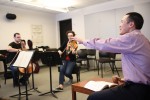Column Name
Title

President Joseph W. Polisi gave a Juilliard President's Medal to Joel Krosnick, the chair of the cello department, after he gave his last Alice Tully Hall concert with the Juilliard String Quartet, which he had joined in 1974. They're pictured with fellow quartet members Joseph Lin, Roger Tapping, and Ronald Copes plus incoming cellist Astrid Schween.
(Photo by Rosalie O'Connor)Joel Krosnick Receives Juilliard President's Medal
Since the beginning of the celebration of Juilliard's centennial, in 2005, President Joseph W. Polisi has honored three dozen people for their extraordinary service to the school. He bestowed the latest Juilliard President's Medal on February 22, when Joel Krosnick, the chair of the cello department, gave his last Alice Tully Hall concert with the Juilliard String Quartet, which he had joined in 1974.
Body
Polisi's speech read as follows:
"You have been the highly esteemed and treasured cellist of the Juilliard String Quartet for 42 years. During that time you have also taught on Juilliard’s cello and chamber music faculties and headed the cello department since 1994. Your impeccable musicianship, deep understanding of the art of ensemble playing, advocacy of new music, and gifts as a teacher have enriched the lives of countless musicians.
"You were raised in a musically nurturing family, with your pediatrician father also a violinist, your mother a highly accomplished pianist, and your brother Aaron destined to become a professional violinist. You and he played chamber music with your mother while growing up. Your teachers included Luigi Silva, Claus Adam, and pianist and conductor Jens Nygaard. Claus Adam was quick to recognize your outstanding talent as a chamber musician, and referred you for many chamber and contemporary music engagements. Your lifelong commitment to new music began while you were earning your Bachelor of Arts degree at Columbia College.
"Concerning your dedication to the performance of new music, I quote what you have so eloquently said on the subject: 'Part of our jobs as musicians is to simply play the music of our time so that we serve history by bringing it forward to future generations. … It is our duty to play contemporary music.' You have shared this passion with your students, whom you have encouraged to become involved with their composer colleagues.
"I also turn to your own astute description of ensemble playing, stated in connection with joining the Juilliard Quartet. You said, 'One of the things about joining a great string quartet is that one not only needs to blend in, but one needs to add one’s voice and figure out how you can add something and how you can respond, which will then eventually change the three voices and change your own voice.' We are grateful for your great artistry in doing that, and then constantly renewing the process throughout the years.
"In celebration of your distinguished tenure in the Juilliard String Quartet and invaluable contributions to the world of music—while in happy anticipation of your continued teaching at Juilliard and leadership of the cello department—it is my privilege to present you with the school’s President’s Medal, a special award reserved for individuals who have made an indelible impact upon the arts and served as vital role models for the profession and for Juilliard."
Chamber Music at Juilliard
Chamber music is at the core of the Juilliard experience. There are currently more than 100 student ensembles, and the Honors Chamber Music Program, the revamped String Quartet Survey course, and ChamberFest, which just celebrated its 15th anniversary, are providing students with more opportunities than ever.
The Honors Chamber Music Program, which began last year, is a new intensive under the leadership of four faculty members: Juilliard String Quartet first violinist Joseph Lin (Pre-College '96) and violist Roger Tapping as well as Joseph Kalichstein (BS '67, MS '69, piano); and cellist Natasha Brofsky (Pre-College '83). There are three string quartets and one piano quartet this year, with members ranging from undergraduate to doctoral students. Through the program, which holds auditions in April, participants receive extra coaching and take part in Chamber Music Society of Lincoln Center master classes. They also take studio classes and must give three performances over the course of the year, including one or more in Alice Tully Hall.
The String Quartet Survey places all first-year undergraduate violinists, violists, and cellists into quartets with scheduled rehearsals and weekly coaching with faculty members Samuel Rhodes and Laurie Smukler (BM '77, violin). Each student spends the year working on quartets by Haydn and Mozart before concluding with a public eight-hour Beethoven marathon on May 1. Second-year violist Jacob Van Der Sloot called the String Quartet Survey's weekly coachings inspiring and said "being able to work on some of the greatest music written" has been a highlight of his time here so far. "We're all able to teach each other," freshman violinist Shenae Anderson added.
All these chamber-music offerings give Juilliard artists a chance to participate in school- and student-initiated projects and, of course, expand their understanding of themselves.—Bärli Nugent (BM '76, MM '77, flute) is assistant dean and the director of chamber music.
Vocal Arts Honors Recital
As winners of this year's Vocal Arts Honors competition, countertenor Jakub Józef Orliński and tenor Miles Mykkanen will perform in a duo recital on March 21. Each year, singer-collaborative pianist pairs are nominated by their teachers to participate in a 10-minute audition for the two spots in the Vocal Arts Honors Recital, an annual highlight since 1997.
In addition to the exposure that comes with singing in Alice Tully Hall, winning the competition also gives young artists an opportunity to put together programs that reflect their deepest artistic convictions. Michał Biel will accompany Orliński, who is pursuing his Graduate Diploma at Juilliard, in music by Handel, Purcell, and Polish composers Szymanowski and Paweł Łukaszewski. (Orliński and Biel are also Polish.) Ho Jae Lee will accompany Mykkanen (BM '13, MM '15), an Artist Diploma candidate, in songs by Schumann, Grieg, and On This Island, Benjamin Britten's masterful setting of five poems by W.H. Auden.—Joshua Simka (BM '14, voice) is the editorial assistant of The Journal.
Spring Master Classes
This spring's roster of public master classes begins on March 14 with the English Concert's artistic director, harpsichordist Harry Bicket, returning to Juilliard to give a Historical Performance master class in Paul Hall. Through a new Juilliard collaboration with medici.tv, three of the spring master classes will be live-streamed by Medici and will also be available to watch on its website for six months. In addition to the Bicket class, the other live-streamed/Medici classes will be given by Fabio Luisi on March 18 and David Finckel on March 21. Luisi, the principal conductor of the Metropolitan Opera, will be giving a vocal arts master class less than a week before conducting the Juilliard Orchestra. Finckel, who joined the Juilliard cello faculty in 2012 and who is the longtime co-artistic director of the Chamber Music Society of Lincoln Center and Music@Menlo, will give an afternoon chamber music master class in Paul Hall on March 21. Other public master classes this spring (not part of the Medici series) will be given by British cellist Steven Isserlis, who will work with cello students in Room 543 on the evening of March 16, and organist Diane Bish, who will be offering a lunchtime master class in Paul Hall on April 28.






